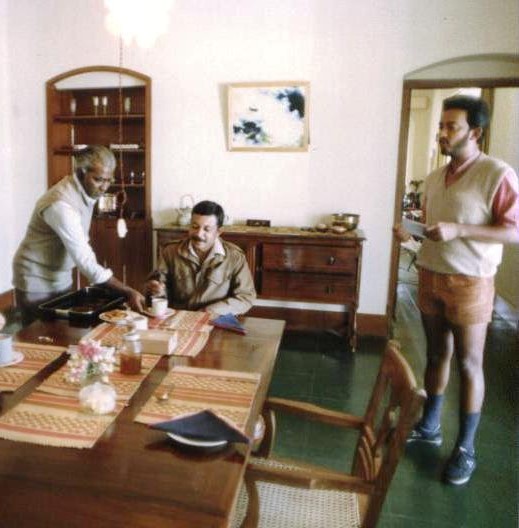
Our servants in the plantations were wonderful people. Many were old hand downs from the British planters who had trained them in their ways. Some had special attitudes inherited from the British, who they imitated faithfully.
The pecking order of servants was very strict. At the top was the Butler. He was cook, waiter, and until you got married, the valet; all rolled into one. He would cook your meal – usually to his own satisfaction. He would serve you at table; supervise those who took care of your clothes, house, car, and garden. He would more often than not iron your clothes himself and would cook some of the special things, especially the puddings. He would ensure that there was always soap in the dish and that the towels in the bathroom were always freshly laundered.
The Butler was followed by the Chokra (a Hindustani word with a derogatory tone which literally means ‘urchin’). This worthy was the assistant of the Butler who did all the cleaning, scrubbing, and polishing work in the bungalow. Then there was the gardener who did all the work outside. If you had a cow, there was the cow-keeper. There was the dhobi (washer man) who washed and ironed your clothes. All these for you as the Assistant Manager.
The Butler made sure that there were always flowers arranged in every room. Some Butlers were excellent artists at arranging flowers, having learned these and other skills including cooking European meals from the wives of British planters. Most useful for us of course.
This experience also gave them a sense of standards that is almost impossible to find today. For example, my Butler Bastian would always be dressed in clean white shirt and dark trousers with a belt. He would always be clean shaven, would always have used something to hide the smell of the cigarettes he used to smoke, which I would never have imagined if I hadn’t actually seen him once without his knowledge. As a courtesy, I never walked into his pantry without making some noise on the rare occasion that I did go. It was always more polite and convenient to ring the bell, conveniently located in every room in the house. He would not wear shoes inside the house no matter how much I tried to force him to do, especially in the cold winters. When we had guests and he could not serve from the correct side, he would say, “Sorry, wrong side Sir.” Nothing was taken for granted, including the fact that most of those who heard this statement had no idea what he meant. They hid their confusion by laughing. He would always greet me at the door when I came home, push my chair in when I sat at table, and then serve me with a towel on his arm. And at the end of the day when I had eaten dinner and he knew I was not going to need anything else, he would come and say, “Good night, Master.” This would be followed by the other servants in strict order of precedence.
When you decided to have a party and invite some people, a very essential part of plantation life, your Butler would advise you about who you should invite and even more importantly, who you should not invite; either because of the wrong image that would give you or because that person did not get along with the other more important guests. He would advise you about what each one liked to drink and what anyone was allergic to. Bastian was horrified when I told him that we would not serve any alcohol. For a long time, he was convinced that he was working for the wrong person because the Butler’s prestige would go up if I was promoted quickly and we moved into the Manager’s bungalow. He held the popular opinion that without serving Scotch whisky at parties to the bosses, I would get nowhere. I suppose he also did not like the thought that he would not be getting his quota free of cost either. I, on the other hand, was of the opinion that promotion must come as a result of performance, not on account of the amount or cost of whisky served. Mercifully, my career progression bore me out and proved him wrong. What, if anything, he did about his quota I never discovered and neither did he ever appear to be under the influence, as it were. So that part of Bastian’s life remains a secret.
When you got promoted and went to the Big Bungalow, you got an additional servant inside the bungalow and a driver for your car. The pecking order remained the same. The pecking order was very strictly followed. Almost always the only person you spoke to or who spoke to you was the Butler. He was the one who handled the money. You would give it to him, to give to the others or to the provision merchant from whom food for the bungalow was bought on credit. Credit played a major role in life as most assistants had no money. Many who liked high living had club bar bills that took up most of their salaries and so they lived on credit. This was obviously an evil because apart from the obvious reasons, many Butlers set up their own kickback systems as a result. It was a given that you would pay more for provisions than other people but that was the burden of being the Chinna Dorai (Small Boss). Many British managers were very stingy and corrupt and set up systems of gratuity and underhand payment in kind that they would write off to some estate expense or the other. These systems were well learnt by their Indian subordinates who added to these systems of subterfuge and deception and ran a very corrupt ‘ship’ as it were.
One cardinal fact of plantation life always took its toll – nothing in planting life was private. If you took a bribe, its exact amount, who gave it, and for what, was the subject of much conversation in the bazaar. If you refused to be corrupt and lived a life of honesty, that also became common knowledge. The result was that the actual love and respect that you received from the workers and staff was directly proportional to the kind of life you lived. And in the end, it affected your own success, the loyalty that people showed you, and the peace of mind you lived with. People spoke with great respect about managers who were seen as incorruptible and with disgust and disdain about managers who were corrupt. And in a place where you were the subject of most conversation, public opinion made a very big difference.
I had two Butlers during my stay in the Plantations. Bastian was with me when I joined in Sheikalmudi as Assistant Manager and remained with me for two years. Then he left and Mahmood (more about him later) joined my service. Mahmood was with me when I got married and stayed with me for a total of about three years. When I returned to Lower Sheikalmudi as the Manager, Mahmood left and settled down in Ooty, his hometown. Bastian then returned to my service and remained with me until I moved to Ambadi Estate in Kanyakumari. He then left and settled in Kotagiri.
A few months later we learnt through the grapevine that Bastian had passed away. I was very sad indeed to hear about his passing. Bastian had been a friend and a very good guide for me to ease into plantation life. A few months later I was in Kotagiri visiting my dear friend Berty, when driving down the road, who do I see walking up the hill, but Bastian. I was so delighted that I yelled out his name and swerved the car to park it, almost making the rumor about Bastian’s ending true in the process. Passersby must have thought it very strange indeed to see this Peria Dorai (Big Boss) jump out of his car and hug an old Butler. But that was my Bastian. A man who served faithfully and who was a friend more than a servant. He was completely loyal to me, preserved confidentiality in all matters, and treated me with utmost respect.

Bastian was a brilliant cook and claimed that he knew more than 100 recipes for soufflés and puddings. I have no doubt he did, and I was the beneficiary of many, if not all. His cream soups were brilliant. So were his fruit soufflés. He would top some of them off with caramelized sugar like an elaborate web. Very stylish. But for the love of anything, he wouldn’t teach anyone else how to cook those things. My wife and many other ladies tried every trick to learn. Bastian would very politely say, ‘Of course Madam. I will teach Madam. Madam come when I am making it.’ But when Madam went there, at the final moment, he would do something to distract attention and there it was all ready and made and Madam would have to wait for the next opportunity. After a few such attempts, Madam got the hint and satisfied herself with eating Bastian’s cooking without trying to learn how to cook it. On one occasion, my wife suggested to Bastian that he should teach the houseboy who was his assistant in the kitchen. Bastian’s response was classic. He said, ‘No Madam. Chokra dull Madam. Can’t learn anything.’ And that was that. Chokra dull Madam. I sometimes say this to my wife about myself, when I am feeling a bit under the weather, “Chokra dull Madam,” and we both have a good laugh remembering Bastian.
Bastian like most of his tribe spoke ‘Butler English’ and was very snobbish. My wife used to speak to him in the same way to make it easier for both to understand what was going on. So sometimes I would come in to hear, ‘Bastian, tomatoes got, not got?’ And Bastian saying, ‘Got Madam. But when Madam going Valparai please kindly bringing cream Madam. Need to make vanilla soufflé for Wood Dorai Madam’s dinner party. If Madam want, I am coming to Valparai with Madam.’ And life would go on.
To understand the snobbery of this breed of Butler, let me tell you about something that happened one day. I was informed at about 10 am that the Tahsildar (a District Administration officer) was going to come to the estate to check on some land matters. I was to give him lunch at my bungalow (most estates had no guest houses or hotels and so all official guests had to be entertained at home for which managers were paid some token amount). So, I drove my old Royal Enfield Bullet, kept running mainly due to the daily attention of Thangavelu the mechanic, up to the bungalow and said to Bastian, “Bastian, the Tahsildar is coming for lunch so please make some extra lunch.”
“O God, Master!” said Bastian.
“What happened? Why are you O Godding, Bastian?”
“Master, I had planned to make fish in white sauce for Master,” said Bastian.
“So just make some more, Bastian!” I said with some impatience.
“Unh! What that man know about white sauce!” snorted Bastian.
So duly, rice and Sambar with two other curries was made. At the end of the meal, Bastian in his usual style, produced crystal finger bowls with warm water and a small slice of lemon on the edge. The Tahsildar, who naturally knew nothing about finger bowls and who came from a place (Pollachi) where people drink warm water, squeezed the lemon into the water and drank it up. As soon as he left there was Bastian with a big grin on his face telling me, “See Master! What I told Master about that man?”
The interesting thing in this story is that the standards that Bastian exemplified were the standards of the British, taken from their culture. The Tahsildar was actually a man who came from the same culture as Bastian himself, yet Bastian identified with and got his own sense of significance from the standards of the British rather than from his own people. The power of indoctrination and identification with the ‘ruling class’ was very visible in plantation society where the culture of the White Sahibs was very much alive and followed to the T by their successors, the Brown Sahibs. Not to say that all these standards were bad. Not at all. Many of them referred to manners, ways of dealing with subordinates with fairness and dignity, the importance of appearance and presentation and the power of the ‘Covenant’ that made the managers ‘Covenanted Staff’ as against all the other staff who were called Non-covenanted. But there was also the element of superiority of race, caste, and more importantly, class. Social class.
For more, please read my book, “It’s my Life”


Very nostalgic and really well expressed. Bastian’s food was always something that went into one’s culinary memory. Samina is a legend though and her mutton dishes are to die for. This always finally takes me back to an era where we had no responsibility or care in the world. We worked hard, played hard and with integrity. We lived life without any thought of the next day. This also bought out another adage I found with my alcoholic relative ( trying to give up the addiction ) whose life was governed by the motto ‘One day at a time’. I… Read more »